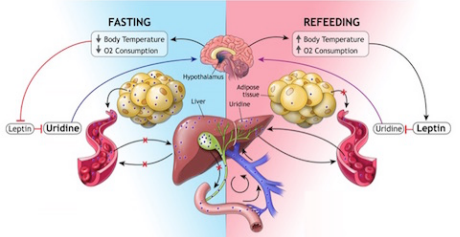Fat Cells Step in to Help Liver during Fasting
Study may have implications for several diseases, including diabetes, cancer, and neurological disorders
 Dr. Philipp Scherer and Dr. Yingfeng DengPhoto courtesy of UT Southwestern Medical CenterDALLAS – How do mammals keep two biologically crucial metabolites in balance during times when they are feeding, sleeping, and fasting? The answer may require rewriting some textbooks.
Dr. Philipp Scherer and Dr. Yingfeng DengPhoto courtesy of UT Southwestern Medical CenterDALLAS – How do mammals keep two biologically crucial metabolites in balance during times when they are feeding, sleeping, and fasting? The answer may require rewriting some textbooks.
In a study published Mar. 16 in Science, UT Southwestern Medical Center researchers report that fat cells “have the liver’s back,” so to speak, to maintain tight regulation of glucose (blood sugar) and uridine, a metabolite the body uses in a range of fundamental processes such as building RNA molecules, properly making proteins, and storing glucose as energy reserves. Their study may have implications for several diseases, including diabetes, cancer, and neurological disorders.
Metabolites are substances produced by a metabolic process, such as glucose generated in the metabolism of complex sugars and starches, or amino acids used in the biosynthesis of proteins.
“Like glucose, every cell in the body needs uridine to stay alive. Glucose is needed for energy, particularly in the brain’s neurons. Uridine is a basic building block for a lot of things inside the cell,” said Dr. Philipp Scherer, senior author of the study and director of UT Southwestern’s Touchstone Center for Diabetes Research.
“Biology textbooks indicate that the liver produces uridine for the circulatory system,” said Dr. Scherer, also professor of internal medicine and cell biology. “But what we found is that the liver serves as the primary producer of this metabolite only in the fed state. In the fasted state, the body’s fat cells take over the production of uridine.”
Basically, this method of uridine production can be viewed as a division of labor. Researchers found that during fasting, the liver is busy producing glucose—and so fat cells take over the role of producing uridine for the bloodstream. These findings were replicated in human, mouse, and rat studies.
Although uridine has many roles, this study is the first to report that fat cells produce plasma uridine during fasting and that a fat cell-liver-uridine axis regulates the body’s energy balance.
Study lead author Dr. Yingfeng Deng, assistant professor of internal medicine, found that blood uridine levels go up during fasting and down when feeding. During feeding, the liver reduces uridine levels by secreting uridine into bile, which is transferred to the gallbladder and then sent to the gut, where it helps in the absorption of nutrients.
“It turns out that having uridine in your gut helps you absorb glucose; therefore uridine helps in glucose regulation,” Dr. Scherer said.
The uridine in the blood works through the hypothalamus in the brain to affect another tightly regulated system—body temperature, Dr. Scherer added. It appears that only uridine made by fat cells reduces body temperature, he said.
Among the study’s other key findings:
- Blood uridine levels are elevated during fasting and drop rapidly during feeding. Excess uridine is released through the bile.
- The liver is the predominant uridine biosynthesis organ, contributing to blood uridine levels in the fed state.
- The fat cells dominate uridine biosynthesis and blood levels in the fasted state.
- The fasting-induced rise in uridine is linked to a drop in core body temperature driven by a reduction in the metabolic rate.
In dietary studies, the researchers found that prolonged exposure to a high-fat diet blunted the effects of fasting on lowering body temperature, an effect also associated with obesity. Further testing indicated those findings were due to the reduced elevation in uridine in response to fasting, said Dr. Deng, also a member of the Touchstone Diabetes Center.
 A UT Southwestern study determined that the metabolite uridine helps the body regulate glucose. This graphic depicts how the body’s fat cell-liver-uridine axis works to maintain energy balance.Image courtesy of UT Southwestern Medical Center Future research questions include studying the effects of feeding-induced reductions in uridine levels in organs that rely heavily on uridine from plasma, such as the heart, and whether bariatric surgery affects blood uridine levels.
A UT Southwestern study determined that the metabolite uridine helps the body regulate glucose. This graphic depicts how the body’s fat cell-liver-uridine axis works to maintain energy balance.Image courtesy of UT Southwestern Medical Center Future research questions include studying the effects of feeding-induced reductions in uridine levels in organs that rely heavily on uridine from plasma, such as the heart, and whether bariatric surgery affects blood uridine levels.
“Our studies reveal a direct link between temperature regulation and metabolism, indicating that a uridine-centered model of energy balance may pave the way for future studies on uridine balance and how this process is dysregulated in the diabetic state,” Dr. Scherer said.
UT Southwestern co-authors from the Touchstone Diabetes Center include: Dr. Ruth Gordillo, assistant professor of internal medicine; Dr. Yu An, postdoctoral fellow; and Dr. Chen Zhang, research associate. Other collaborators were Dr. Zhao Wang, assistant professor of internal medicine; Dr. Qiren Liang, research scientist; Dr. Kelly Cautivo, former postdoctoral fellow; Dr. Jef De Brabander, professor of biochemistry and in the Harold C. Simmons Comprehensive Cancer Center; Dr. Joel Elmquist, chief of the Division of Hypothalamic Research; Dr. Jay Horton, director of the Center for Human Nutrition; and Dr. Joseph Hill, chief of the Division of Cardiology.
Dr. Scherer holds the Gifford O. Touchstone, Jr. and Randolph G. Touchstone Distinguished Chair in Diabetes Research; Dr. De Brabander holds the Julie and Louis Beecherl Jr. Chair in Medical Science; Dr. Elmquist holds the Carl H. Westcott Distinguished Chair in Medical Research, and the Maclin Family Distinguished Professorship in Medical Science, in Honor of Dr. Roy A. Brinkley; Dr. Horton holds the Distinguished Chair in Human Nutrition, The Dr. Robert C. and Veronica Atkins Chair in Obesity & Diabetes Research, the Scott Grundy Director’s Chair, and the Center for Human Nutrition Director’s Endowed Chair; and Dr. Hill holds the James T. Willerson, M.D., Distinguished Chair in Cardiovascular Diseases, and the Frank M. Ryburn, Jr. Chair in Heart Research.
Researchers from Washington University School of Medicine in St. Louis also participated.
The study received support from the American Diabetes Association, the American Heart Association, the National Institutes of Health, and The Welch Foundation.
